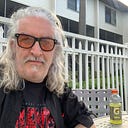Spotlight series #63 : Mark Tardi
Curated by Canadian writer, editor and publisher rob mclennan, the “spotlight” series appears the first Monday of every month.
STATEMENT
I have to see a shape. Without a shape, I could have all the language in the world but wouldn’t know where to put it. The shape could be for a single poem or it could be for a sequence, sort of like flipping through the pages of an architectural plan. While it’s true that I’m constantly squirreling away lines and fragments and ideas and quotes and things I’ve heard or misheard (in what we used to call conversations), none of them have a place to land until a shape emerges. Once I do have a shape, a Dickinsonian springboard can be installed and a poetic window, building, sound system, or world can develop. Since I became a parent a few years ago, the contours of the shapes have gotten softer, maybe more gestural, and the geometries more domestic. And as my son dances between languages — English and Polish — this blurring of boundaries, languages, and time has taken root in my writing. I used to worry that perhaps some of these inclusions would be unpronounceable or off-putting for English-language readers. Similarly, as an American immigrant living in a village in central Poland, I initially had some concerns about how I might be perceived by the neighbors as a guy in his mid-40s throwing a baseball to himself in his backyard — without them even knowing that I’m imagining shapes for poetic compositions while doing so. But as a guy in his mid-40s throwing a baseball to himself in his backyard, it seems much more important to track the flight of the ball and throw it on a trajectory that doesn’t hit our solar panels.
TWO POEMS
Half Sonnet
— for Sarah Ruhl
My bed has lost its boundaries
and my head is probably
not long breaks
from the music.
A shoulder is not a person
but its disruption
takes down the foundation.
Half-Sonnet
Jestem Amerykaninem i jestem Amerykaninem
i jestem. Just as color is a tongue unspoken. A cortex
as translucent as the atmosphere — the usable past —
just as likely your left-brained window,
a piece of bread laced with caves,
silent, ischemic. A composed demeanor
then and for a few moments to come.
Mark Tardi is a writer, translator, and lecturer on faculty at the University of Łódź. He is the author of three books, most recently, The Circus of Trust (Dalkey Archive Press, 2017). Recent work and translations have appeared or are forthcoming in Denver Quarterly, Circumference, Armstrong Literary, Another Chicago Magazine, Jet Fuel Review, Berlin Quarterly, La Piccioletta Barca, Notre Dame Review, and elsewhere. His translation of The Squatters’ Gift by Robert Rybicki was published by Dalkey Archive Press in 2021.
